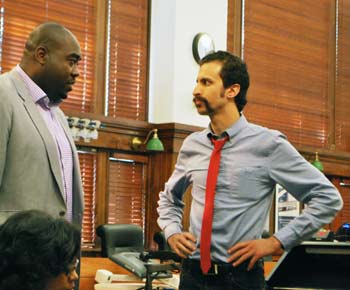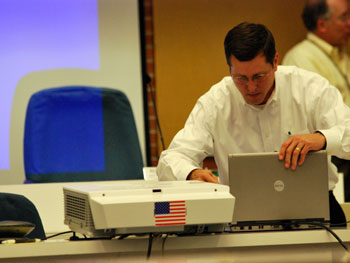County Board Eyes Slate of Revenue Options
Washtenaw County board of commissioners working session (Aug. 8, 2013): A range of ways to bring in additional revenues – including increases to existing taxes, or new millages requiring voter approval – are being explored by county commissioners. They’re working to overcome a nearly $4 million budget deficit in 2014 without further cuts to programs and services.

Yousef Rabhi, right, chair of the Washtenaw County board of commissioners, talks with Shamar Herron, workforce development manager in the county’s office of community & economic development, at the county board’s Aug. 8, 2013 working session. (Photos by the writer.)
A memo prepared by Conan Smith (D-District 9) outlined six options for generating more tax revenue. Three of those options would not require voter approval, because the Michigan statutes that authorize the millages predate the state’s Headlee Amendment. The board already levies two of these types of taxes – for indigent veterans services, and agriculture/economic development – but doesn’t yet levy the full amount allowed by law. The third tax in this category, which the county doesn’t levy now, would pay for road repair.
Other approaches would need voter approval. A Headlee override – allowing the board to raise its operating millage to the cap of 5.5 mills, from the current rate of 4.5493 mills – would result in an additional $13.5 million in tax revenues next year. The rate of 5.5 mills has been rolled back over the years by the Headlee Amendment, which was designed to prevent property tax revenues from increasing faster than the rate of inflation.
Commissioners also discussed the possibility of putting a millage proposal on the ballot for specific purposes, like public safety. Sheriff Jerry Clayton attended the working session and stressed the importance of funding for public safety.
A targeted millage could also pay for annual contributions toward the county’s unfunded pension and retiree healthcare obligations. But that strategy would not eliminate the entire amount of unfunded liabilities, estimated at nearly $300 million. A controversial bond proposal intended to eliminate those obligations was halted in early July. [See Chronicle coverage: "County to Push Back Vote on Bond Proposal."] However, on Aug. 8 some commissioners indicated that bonding was not off the table, and could still be considered. Michigan’s Public Act 329 of 2012, which enables municipalities to issue bonds for these kinds of obligations, has a sunset of Dec. 31, 2014.
In other possible revenue strategies, Conan Smith also advocated to use some of the general fund’s roughly $16 million fund balance, to support one-time investments like capital expenditures or to replenish fund balances in specific departments. He had made a similar proposal at the board’s Aug. 7, 2013 meeting, but did not win support for it from the majority of commissioners.
At their working session, several commissioners expressed general support for seeking some kind of voter-approved tax, either a Headlee override or a targeted millage. There seemed to be less support for tapping the general fund’s fund balance. Yousef Rabhi (D-District 8) described the fund balance approach as “a short-term energy pill. It’ll get us a couple feet down the road, but it won’t give us the miles that we need.”
It’s unlikely that a millage proposal would be put on the November ballot. To do so, the board would need to take action this month, which would require calling a special meeting. The board’s next scheduled meeting is Sept. 4.
The Aug. 8 working session also included a presentation by Mary Jo Callan, director of the county’s office of community and economic development, about current and proposed initiatives related to economic development. The session was attended by Ann Arbor SPARK executives, including CEO Paul Krutko.
This report focuses on the board’s budget discussion. [Full Story]




